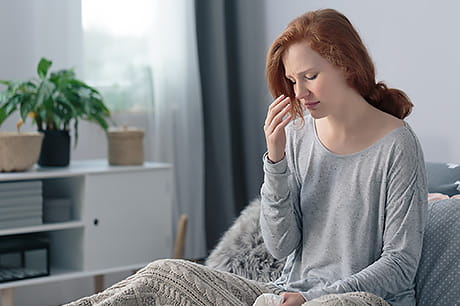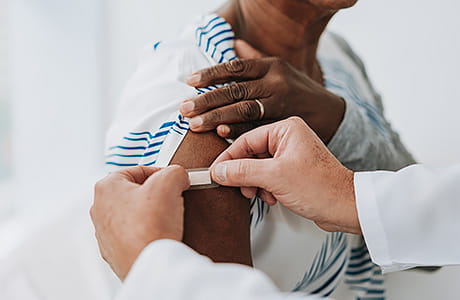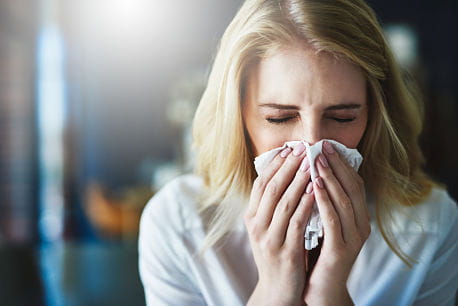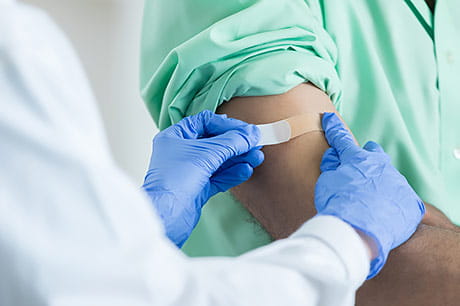5 things to know about recovering from COVID-19 at home
You’ve tested positive and been sent home to rest and recover. What next?
If you’re at home with a positive COVID-19 diagnosis, you may be wondering what, exactly, you should be doing. And you aren’t alone. Fortunately, most people who contract COVID-19 will recover without needing to be admitted to the hospital.
However, you could feel the effects of the virus longer than the five-day period you’re required to be isolated from others if you’ve tested positive (whether or not you’re vaccinated). For the latest in isolation guidelines, visit the CDC’s website.
“Although every person is different, it can take longer than two weeks before those who are diagnosed with COVID-19 start to feel better,” explains family medicine physician Amit Mehta, MD, medical director of community medicine for Geisinger in Centre County.
To help you be on your way to feeling better, here are some guidelines to follow.
1. Call your doctor.
The first and most important step is to call your primary care physician. Make sure your doctor is aware of your diagnosis and symptoms and then follow their advice on at-home treatment.
“I can’t stress how important this is,” says Dr. Mehta. “Your physician knows your history and can offer the best instructions for your recovery.” Your primary care doctor can also help connect you with available resources to help deal with the physical, mental and social aspects that may come with COVID-19.
At the same time, there are general recommendations anyone can follow to help relieve symptoms, starting with getting plenty of rest.
2. Stay hydrated.
“If you’re at home treating COVID-19 symptoms, remember to stay hydrated,” Dr. Mehta says. “Drink at least 64 to 70 ounces of water every day.”
To replace lost electrolytes — which can happen through fever-induced sweating, for example — you may want to consider a half-and-half mixture of water and an electrolyte-rich sports drink, such as Gatorade or Powerade. And you should avoid alcohol and caffeinated drinks, which can lead to dehydration.
“If you become dehydrated, it can make your symptoms even worse,” adds Dr. Mehta.
3. Be sure to eat.
Depending on the severity of your symptoms, you may not feel like eating. But if you don’t eat, you may feel even worse.
“Bland foods like broths, toast and avocado are good choices,” says Dr. Mehta. “But one of the best foods you can eat is chicken noodle soup, or a vegan noodle and broth soup. It’s nourishing, easy to make and easy to digest.”
4. Monitor your symptoms.
If you do have a fever, acetaminophen (like TYLENOL®) can help control it — but you should speak with your doctor about what’s best for you. The same goes if you develop a cough and are wondering how to best treat it.
“Your doctor knows your medical history and can give you the best advice,” says Dr. Mehta.
If you are recovering at home, monitor your symptoms carefully and contact your provider if your symptoms worsen. If possible, monitor your temperature, oxygen levels (if you have access to a pulse oximeter) and blood pressure. This information can be very helpful if you're recovering at home and are in touch with your doctor's office throughout your recovery.
If you develop emergency warning signs for COVID-19, get medical help immediately. Emergency symptoms include:
- Difficulty breathing or shortness of breath
- Persistent pain or pressure in the chest
- Bluish lips or skin
- Sudden confusion or inability to awaken
- Excessive diarrhea, or moderate to severe abdominal pain
In an emergency, call 911 or head to the nearest emergency room.
5. Know the best ways to stop the spread.
If you're self-treating, you might be worried about passing the virus to someone else. By taking these simple steps, you can help stop the spread of COVID-19 in your community:
- Stay home whenever possible. If you have to go out, wear a mask and stay at least 6 feet away from others.
- Wash your hands often — and for at least 20 seconds. Use hand sanitizer and wipes with at least 60% alcohol. And avoid touching your face and eyes.
- Know the COVID-19 symptoms. If you develop symptoms of COVID, call your doctor. They can tell you how to best treat your symptoms and what to do if they worsen.
- Get vaccinated. COVID-19 vaccines — and booster shots — help protect you against COVID, even if you’ve already had the virus.
If you have been diagnosed with COVID-19 or have had possible exposure, be sure to follow the most up-to-date guidelines from the PA Department of Health and the Centers for Disease Control and Prevention. You can always call your doctor for advice or guidance throughout your recovery, or if you think you might have been exposed.
Next steps:
How to bounce back from a bug
Watch: The difference between isolation and quarantine
Is it a cold, flu or COVID-19?





